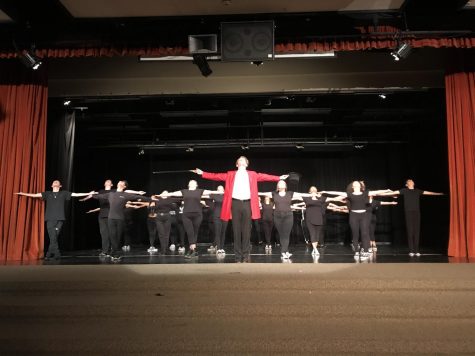When did an A in math become a priority for a performing arts student?
October 19, 2018
Have you ever sat in a certain classroom and thought, “Why am I even taking this class? When will this matter? Why am I here?” I say these things almost daily. In my future, I want to pursue a career that revolves around Performing Arts, so why am I stuck in an American History class learning about the people that wrote the Bill of Rights when I could be learning about the history of theatre? Why am I stuck in an Integrated Math 3 class learning how to divide polynomials when instead, I could be learning how to pay taxes.
I do believe that it is important for people to have a basic understanding of science, math, and history, but why is it needed for students to focus more on those classes than on the career that they want to pursue? There is no balance in high school, and once we graduate, reality will hit us full force. Maybe high schools need to take a page out of colleges books. If we’re supposed to be college and career ready, why are so many core academic courses shoved down our throats?
For a while, when I was younger, I had a difficult time in some of my science and math subjects; they were some of my toughest classes. But, when I started to get more serious about singing and performing, I realized that I am not going to need the level of science and math that is pushed on high-school students in that career. It doesn’t make things better when you are constantly being reprimanded for not having the best of grades in those subjects, but when a student that excels in academics is not that good at the arts, they get told that it’s okay; that it’s just “not their thing.”
In an education article titled, “Forced to Pick a Major in High School” by Winnie Hu, The New York Times reported that there are several states that have initiated a requirement of students to declare a major at the high school level. Florida districts will require every ninth grader to major in one of more than 400 state-approved subjects, ranging from world cultures to fashion design to family and consumer sciences. South Carolina enacted a similar law last year, designating 16 career clusters, including architecture, government, and agriculture. In Mississippi, a $5 million pilot program in 14 districts…will have ninth graders following one of seven career paths, like construction and manufacturing or science, technology, engineering, and math.”
Mitchell Stevens, an associate professor of education and sociology at New York University, who sees the move as a way for public schools to provide a broader menu of educational choices said, “They tailor academic instruction around the needs and desires of their children in order to encourage them to do well in school.”
At Don Lugo, I have to admit, I’m sort of jealous of the engineering and agriculture students on our campus. Their schedules and class selection is purposely chosen for them with a focus in each of those careers. They are motivated to do well and enjoy learning because they are taking courses that are created specifically for their interests. Their academy life is an example of knowing that an academic program rich in career focus is possible and that fact is worthy of Wicked green envy.
Chino Valley Unified School District has at least one academy model in every high school in our district, but what I don’t understand, is why there aren’t more? For a school that is so focused on positive behavior, recognizing academic achievement, and addressing the knucklehead population that exists at our school, why wouldn’t the district spend more time considering a push for more academies at each of our high schools?
Students should be able to start picking out classes that are essential for the career that they want to pursue. Students should be celebrated for what they excel in rather than constantly being reminded they are not an A student in math. If students started their search for a potential career in high school, then deciding what to major in when ready for college would be a much easier process. In fact, Winnie Hu reports that “college admissions officers have said over the years that they favor students with expertise in particular areas since it demonstrates commitment and passion.”












Karly Ortiz • Nov 9, 2018 at 12:52 PM
Great article! I agree 100% with your claim.